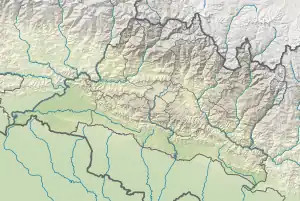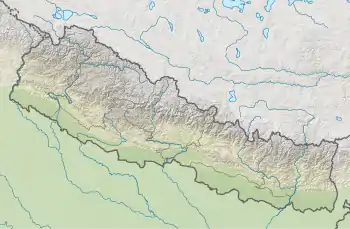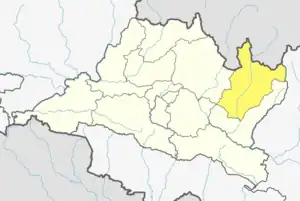Shailung Rural Municipality
Shailung is a rural municipality located within the Dolakha District of the Bagmati Province of Nepal. The municipality spans 96.30 square kilometres (37.18 sq mi) of area, with a total population of 20,098 according to a 2011 Nepal census.[1][2]
Shailung
शैलुङ गाउँपालिका Sailung Bhanjyang | |
|---|---|
 Shailung Location  Shailung Shailung (Nepal) | |
| Coordinates: 27.63°N 85.98°E | |
| Country | |
| Province | Bagmati |
| District | Dolakha |
| Wards | 8 |
| Established | 10 March 2017 |
| Government | |
| • Type | Rural Council |
| • Chairperson | Mr. Bharat Prasad Dulal |
| • Vice-chairperson | Mrs. Lalmaya Yonjan (Ghising) |
| Area | |
| • Total | 96.30 km2 (37.18 sq mi) |
| Population (2011) | |
| • Total | 20,098 |
| • Density | 210/km2 (540/sq mi) |
| Time zone | UTC+5:45 (Nepal Standard Time) |
| Headquarter | Katakuti |
| Website | shailungmun |
On March 10, 2017, the Government of Nepal restructured the local level bodies into 753 new local level structures.[3][4] The previous Dudhpokhari, Bhusapheda, Magapauwa, Katakuti, Phasku and Shailungeshwar VDCs were merged to form Shailung. Shailung is divided into 8 wards, with Katakuti declared the administrative center of the rural municipality.
Demographics
At the time of the 2011 Nepal census, Shailung Rural Municipality had a population of 19,698. Of these, 68.8% spoke Nepali, 30.6% Tamang, 0.1% Maithili, 0.1% Newar, 0.1% Sherpa and 0.2% other languages as their first language.[5]
In terms of ethnicity/caste, 34.4% were Chhetri, 31.0% Tamang, 19.3% Newar, 5.0% Kami, 2.9% Hill Brahmin, 2.7% Magar, 1.6% Gharti/Bhujel, 1.5% Damai/Dholi, 0.7% Gurung, 0.2% Sanyasi/Dasnami, 0.2% Thami, 0.1% Badi, 0.1% Ghale, 0.1% Sarki, 0.1% Sherpa and 0.2% others.[6]
In terms of religion, 65.6% were Hindu, 32.4% Buddhist, 1.9% Christian and 0.1% others.[7]
In terms of literacy, 59.9% could read and write, 2.1% could only read and 38.0% could neither read nor write.[8]
References
- "District Corrected Last for RAJAPATRA" (PDF). www.mofald.gov.np. Retrieved 17 July 2018.
- "स्थानीय तहहरुको विवरण" [Details of the local level bodies]. www.mofald.gov.np/en (in Nepali). Ministry of Federal Affairs and Local Development. Retrieved 17 July 2018.
- "New local level structure comes into effect from today". www.thehimalayantimes.com. The Himalayan Times. 10 March 2017. Retrieved 17 July 2018.
- "New local level units come into existence". www.kathmandupost.ekantipur.com. 11 March 2017. Retrieved 18 July 2018.
- NepalMap Language
- NepalMap Caste
- NepalMap Religion
- NepalMap Literacy
